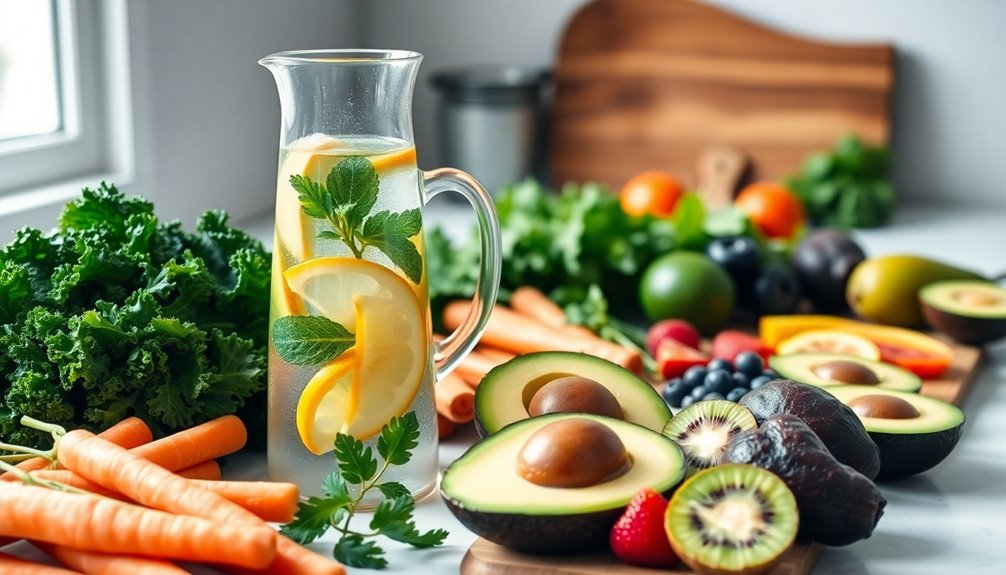Detoxing your body after overeating is essential for your well-being. Start by hydrating well; drink plenty of water and consider herbal teas to flush out toxins. Focus on whole foods like fruits, vegetables, and lean proteins while avoiding processed snacks. Incorporate light exercise, such as walking or yoga, to boost metabolism and mood. Prioritize your digestive health by including fiber-rich foods and probiotics. Don't forget to rest; quality sleep is essential for recovery. Finally, embrace mindfulness techniques to reduce stress and improve your overall mindset. Discover more strategies to support your journey ahead.
Key Takeaways
- Increase water intake to flush out toxins and maintain hydration; consider electrolyte-enhanced beverages for mineral replenishment.
- Incorporate fiber-rich whole foods like fruits, vegetables, and legumes to support digestion and regular bowel movements.
- Engage in light exercise such as walking or yoga to boost mood and aid food processing in your body.
- Prioritize quality sleep by establishing a bedtime routine and aiming for 7-9 hours of rest for efficient detoxification.
- Practice mindfulness techniques like meditation or journaling to reduce stress and enhance mental clarity post-overeating.
Hydrate Effectively

Hydrating effectively is vital after a bout of overeating, as it helps your body recover and flush out toxins. When you've indulged a bit too much, your body needs support to regain its balance. Increasing your water intake is one of the simplest yet most powerful methods to help your system reset. Aim for at least eight glasses of water a day, but adjust based on your activity level and the food you've eaten.
It's not just about drinking water; you also need to maintain your electrolyte balance. Electrolytes, like sodium and potassium, play an essential role in hydration. When you overeat, especially salty or processed foods, your body can become imbalanced. To remedy this, consider incorporating foods rich in potassium, such as bananas or spinach, into your meals.
Additionally, you might want to try electrolyte-enhanced beverages, which can aid in replenishing lost minerals while keeping you hydrated. Following a custom keto diet plan can also help manage your food choices and ensure you're consuming nutrients that support hydration.
Listen to your body—if you're feeling sluggish or your digestion seems off, it might be a sign that you need to hydrate more. Drinking herbal teas or infused water can also make your hydration routine more enjoyable and satisfying. Remember, you're not alone in this; many people face the same challenges. By focusing on proper hydration, you're not just detoxing your body; you're also fostering a sense of well-being.
Incorporate Light Exercise

How to Detox Your Body After Overeating
Incorporate Light Exercise
What's the best way to kickstart your recovery after overeating? Light exercise can work wonders! It helps your body process food more efficiently, reduces bloating, and boosts your mood. Here's how you can incorporate it into your routine:
- Start with a Stretching Routine: Begin by gently stretching your muscles. This not only relieves tension but also encourages blood flow, making you feel more energized.
- Engage in Low Impact Cardio: Activities like walking, cycling, or swimming can be excellent for getting your heart rate up without putting too much strain on your body. Aim for at least 20-30 minutes; it's a great way to clear your mind while helping your digestive system.
- Listen to Your Body: If you feel fatigued, don't push yourself too hard. Instead, opt for lighter exercises that feel comfortable to you, ensuring you stay connected to your body's needs.
- Make it Social: Consider inviting a friend to join you. Exercising together not only motivates you but also fosters a sense of community and support, which is essential in your recovery journey. Additionally, incorporating dynamic exercises can enhance your core strength, leading to better overall health and wellness.
Focus on Whole Foods

After a bout of overeating, focusing on whole foods can greatly assist your recovery. Whole foods are unprocessed or minimally processed foods that retain their natural nutrients. By emphasizing these options, you can create nutrient-rich meals that nourish your body and help you feel more balanced. Think fresh fruits, vegetables, whole grains, lean proteins, and healthy fats.
When you prioritize whole foods, you're not only giving your body the essential nutrients it craves but also promoting a balanced diet that supports overall wellness. Nutrient-rich meals help stabilize your blood sugar levels, which is pivotal after indulging. This stabilization can lead to reduced cravings, making it easier to stay on track with your health goals. Additionally, adopting a plant-based diet can further enhance your health and well-being while providing a wide array of nutrients.
Incorporating a variety of colorful fruits and vegetables into your meals will ensure you're receiving a wide range of vitamins and minerals. Don't shy away from experimenting with different grains like quinoa or brown rice, and opt for lean sources of protein, such as chicken, fish, or plant-based options. These choices will keep you feeling satisfied while providing the energy you need to navigate your day.
Prioritize Digestive Health

A healthy digestive system plays a significant role in how your body recovers after overeating. When you indulge a bit too much, prioritizing your digestive health can make a substantial difference. Here's how you can support your body:
- Hydrate: Drinking plenty of water helps flush out toxins and supports the production of digestive enzymes, which are essential for breaking down food.
- Incorporate Probiotics: Foods like yogurt and fermented vegetables can improve your gut microbiota, enhancing your digestion and overall gut health.
- Eat Fiber-Rich Foods: Whole grains, fruits, and vegetables boost your digestive system by promoting regular bowel movements and feeding beneficial gut bacteria.
- Avoid Processed Foods: These can disrupt your gut microbiota and slow down digestion, making recovery after overeating more challenging.
- Understand Natural Calorie Cycles: Embracing natural calorie cycles can help your body recover more effectively by aligning with its biological rhythms.
Rest and Rejuvenate

Your body deserves some well-earned rest and rejuvenation after a bout of overeating. When you've indulged a bit too much, allowing yourself time to recover is vital. Rest isn't just a luxury; it's a necessity for your physical and mental well-being. Engaging in restorative practices can help your body rebalance and heal.
Start by prioritizing sleep. A good night's rest can help your body digest and metabolize food more efficiently. If you're feeling particularly sluggish, consider taking a power nap during the day. Studies show that short naps can enhance alertness and improve mood, making it easier for your body to recover from overeating.
In addition to sleep, meditation for relaxation can be a game-changer. Spending even just a few minutes focusing on your breath can reduce stress and promote a sense of calm. This practice not only helps to ease the discomfort of overeating but also fosters a deeper connection with your body. Engaging in mindfulness meditation can further enhance your recovery by improving focus and reducing stress levels.
Consider incorporating guided meditations into your routine to help you unwind and reset.
Practice Mindful Eating

Rest and rejuvenation set the stage for a healthier relationship with food, making mindful eating a valuable practice to adopt moving forward. When you practice mindful eating, you cultivate awareness of your body's hunger and fullness signals, helping you make informed choices about what and how much to eat. Here are some tips to guide you:
- Slow Down: Take your time during meals. Chew your food thoroughly and savor each bite.
- Limit Distractions: Avoid eating while watching TV or scrolling on your phone. Focus solely on your meal.
- Tune Into Emotions: Recognize emotional triggers that lead to overeating. Ask yourself if you're truly hungry or eating for other reasons.
- Practice Mindful Snacking: Choose healthy snacks and relish the flavors. Mindful snacking can help you connect with your cravings and make better choices.
Incorporating a research-based approach to eating habits can enhance your mindfulness and support your overall health goals.
Frequently Asked Questions
How Long Does It Take to Feel Normal After Overeating?
After overeating, it typically takes a few hours to a couple of days to feel normal again. Your hydration levels play a pivotal role; drinking water can help with digestion and alleviate discomfort. Engaging in light physical activity, like a walk, can also aid your body's recovery by boosting circulation and metabolism. Remember, it's all about listening to your body and giving yourself the care you deserve during this process.
Can Detoxing Help With Weight Loss?
Yes, detoxing can aid in weight loss, but navigating detox myths with care is crucial. Many believe detox supplements offer quick fixes, but they often lack scientific backing. Instead, prioritize whole foods, hydration, and balanced meals to support your body's natural detoxification processes.
Are There Specific Foods to Avoid When Detoxing?
When you're detoxing, it's essential to avoid certain foods that can hinder your progress. Steer clear of sugary snacks and drinks, as a sugar detox will help reduce cravings and inflammation.
Additionally, eliminate alcohol from your diet during an alcohol cleanse, since it can disrupt your body's natural detox processes.
Focusing on whole, nutrient-dense foods instead creates a supportive environment for your body to thrive and heal.
You've got this!
Is Intermittent Fasting Beneficial After Overeating?
Intermittent fasting can be beneficial after overeating, as it may enhance metabolic flexibility. By practicing calorie cycling, you give your body a chance to reset and adapt to different energy intakes. This approach helps regulate hunger hormones and can aid in digestion.
Can Herbal Teas Aid in Detoxing the Body?
Herbal teas can definitely aid in detoxing your body. They're packed with antioxidants and can promote hydration, which enhances water consumption benefits.
By sipping on herbal teas like dandelion or green tea, you help your body eliminate toxins naturally. These teas also support digestion, making it easier for your system to recover.
Embracing this simple habit can lead to a healthier you, and you'll feel more balanced and energized in no time!
Conclusion
Detoxing your body after overeating isn't just about recovery; it's a chance to reconnect with your wellness journey. By hydrating, exercising lightly, and choosing whole foods, you'll support your digestive health and feel rejuvenated. Remember, it's not just about what you eat but how you eat. Are you ready to treat your body with the care it deserves? Embrace mindful eating and rest, and you'll emerge feeling revitalized and empowered to make healthier choices moving forward.



